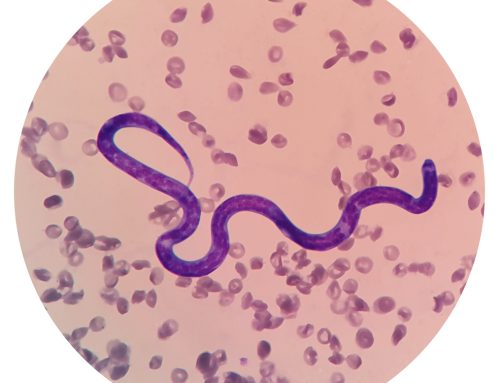You take your dog to the veterinarian for its annual exam, and sit through their spiel on routine wellness plans and recommendations. Some vets may spend a lot of time on the subject of heartworm disease, going into much detail on what the disease is and how to prevent it, and some may speed through it and just recommend the prevention and go on with the exam. This blog post will go into a little more detail on why prevention (versus treatment) of heartworm disease is so important, even in Ohio.
What is heartworm disease?
Heartworm disease (Dirofilariasis) is a parasitic infestation in dogs (and also cats and a few other species) caused by the nematode Dirofilaria immitis. Mosquitoes are needed to transmit the parasite, but only a small percentage (roughly 2%) of mosquito species are suitable hosts.
What is the life cycle of the parasite?
- Mosquitoes ingest first stage larvae during a blood meal from an infested host.
- The larvae go through 2 molts during a 2-3 week period while in the mosquito, which results in the third stage infective larvae.
- The third stage larvae are then placed into a host (ie, a dog) when the mosquito feeds on it.
- 2 more molts occur over a period of 2-3 months while the larvae migrate through the tissues to the bloodstream.
- The fifth stage larvae enter the venous circulation and then make their way to the pulmonary (lung) arteries.
- Once in the pulmonary arteries, they molt one more time into adults, over a period of 3-7 months.
- dults then start producing the first stage larvae ~6-7 months after the dog was first infected with the parasite, and the cycle continues.
Eventually, if heartworm disease goes undetected and progresses, congestive heart failure and death can occur. Hypertension (increased blood pressure) of the pulmonary arteries often occurs as well.
How is heartworm disease detected?
A blood antigen test that recognizes adult heartworms is usually the diagnostic test of choice. Checking the blood for first stage larvae (microfilaria) which are produced by adult heartworms can also be done. X-rays of the thorax in dogs with progressed disease can shows signs of dilated pulmonary arteries and/or congestive heart failure.
What’s the earliest that heartworm disease can be detected?
Since adult heartworms being present are necessary for the antigen test to show positive, 6-7 months post infection is the earliest heartworm disease can be detected, as that is how long it takes for adult heartworms to develop. For this reason, testing puppies that are 6 months old or younger is pointless.
Is heartworm disease treatable?
Yes, however the disease must be staged (Class 1-4) prior to starting treatment, which can be expensive. X-rays of the chest, an ECG to check the heart rhythm, and bloodwork to ensure liver function is ok are all necessary prior to instituting treatment; in some cases, and ultrasound of the heart may be necessary as well. The medication is injected deep into the back muscles, and must be repeated (speak to your veterinarian for more details). The medication is expensive and often difficult to obtain. The dog must be kept confined post treatment for 2-4 weeks to prevent complications, and must stay on pain medications and anti-inflammatories. For Class 3 and 4 cases, the prognosis is guarded even with treatment.
How is heartworm disease prevented?
There are a number of different medications on the market that have been FDA approved for the prevention of heartworm disease. It is much cheaper, easier, and safer to prevent heartworm disease than it is to treat it. It is recommended by the veterinarians at Twin Maples Veterinary Hospital to start prevention as a puppy, give it once a month, and continue it year-round. It is also advised to have a heartworm test once per year to ensure that your dog is heartworm negative.
What about cats?
Cats can get heartworm disease, but present in a different way than dogs, and annual heartworm testing is generally not recommended. A future blog will address cats and internal parasites; for questions now please speak to your veterinarian.
The next time you and your dog are in for an annual wellness exam, if you have any questions about which heartworm preventive product is best for your dog, please do not hesitate to ask your veterinarian. Remember, prevention is key!









Leave A Comment